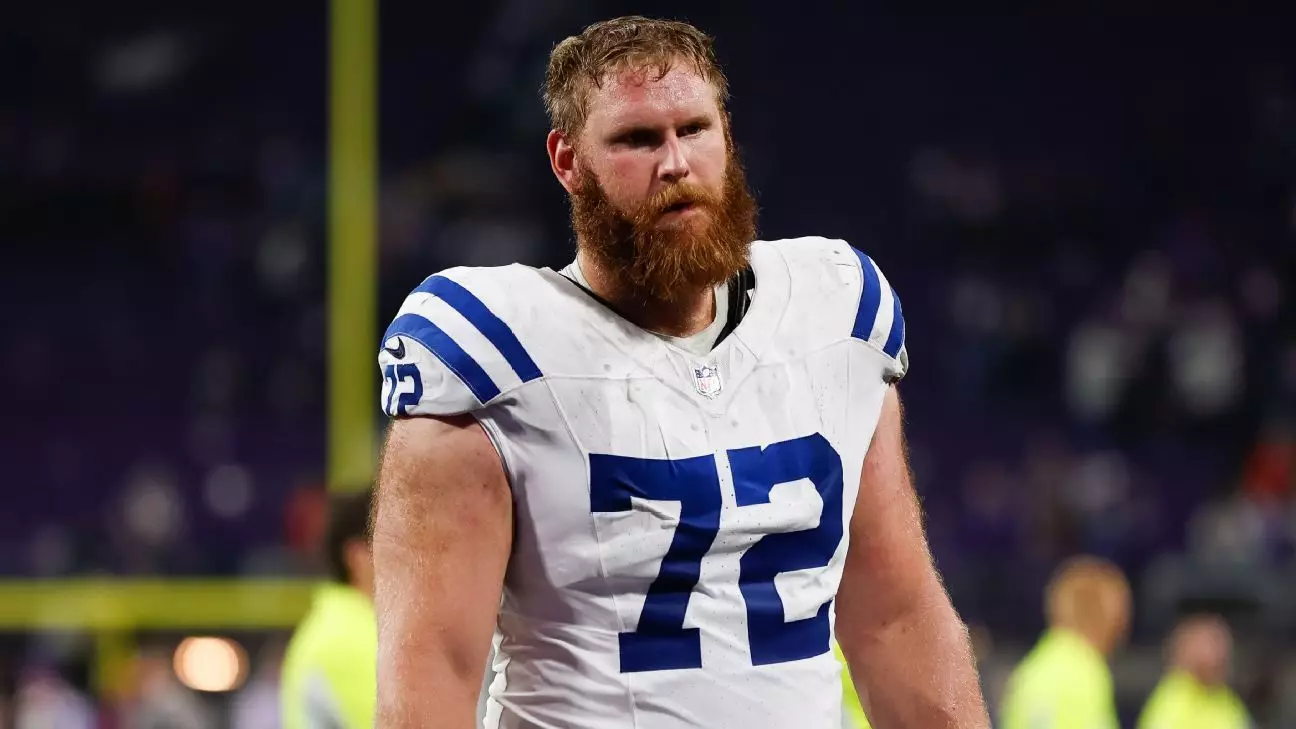In an entirely candid revelation, Indianapolis Colts offensive tackle Braden Smith opened up about his mental health struggles that sidelined him for the final stretch of the last NFL season. This wasn’t just a temporary setback; it was a profound personal battle that pushed him to the brink. At the heart of Smith’s narrative lies a chilling confrontation with obsessive-compulsive disorder (OCD), a condition that led him to a dark place where the thought of suicide crossed his mind—a reality that many might not associate with a professional athlete. The complexities of mental health often remain hidden behind the façade of physical prowess and competitive spirit, yet Smith’s willingness to expose his vulnerabilities serves as a powerful reminder of the human condition beyond the playing field.
The Weight of Religious Scrupulosity
Smith’s revelation that he suffers from a specific form of OCD known as religious scrupulosity paints a poignant picture of his inner turmoil. This condition, characterized by an obsessive fear of sinning or offending a higher power, significantly dominated Smith’s daily existence. With unwavering pressure to meet the impossible standards of perfection, he found himself consumed by anxiety, engaging in compulsive behaviors that drained him mentally and emotionally. The constant cycle of guilt and ritualistic behaviors—such as excessive prayer or repentance—became his prison. It is essential to understand that these types of mental health disorders may not be well known to the general public, yet they can manifest into life-altering challenges, requiring nuanced and comprehensive support to navigate.
The Road to Recovery
Smith’s journey to healing was not straightforward. Seeking help from a psychologist marked a courageous first step, but despite his efforts, he felt stagnant. This led to a pivotal choice: checking into a mental health facility in Colorado, which he did in November. The simple act of seeking help can be daunting, yet he took it even further by exploring unconventional treatment methods, including the use of ibogaine—an illicit psychedelic therapy pursued abroad. This raises critical conversations about mental health treatment availability and the boundaries of medical legality. While the stigma attached to psychedelics remains entrenched in society, Smith’s experience challenges us to rethink the paradigms of mental health treatment and the desperate measures that some individuals explore when traditional avenues do not yield relief.
Empowerment Through Vulnerability
Braden Smith’s transition from despair to empowerment is a testament to resilience. He has not only transformed his mental landscape but has also reinvigorated his desire to connect with loved ones and reclaim his identity as both a player and a person. „I want to be me again,“ he expressed, emphasizing the profound impact mental health can have on an individual’s life and relationships. Moreover, his journey resonates with an imperative truth: mental health struggles do not define an individual, yet they can be pivotal in shaping a more authentic self. The weight of his past torment has morphed into a commitment to live genuinely, free from the chains that once held him captive.
The Colts’ Support System
The response from the Indianapolis Colts organization further underscores the importance of a supportive environment in professional sports. General manager Chris Ballard’s endorsement of Smith’s progress illustrates a broader cultural shift toward prioritizing mental health within athletics. This acceptance can motivate other athletes facing similar struggles to seek help and speak out about their experiences. Smith’s decision to return to the Colts under a restructured deal reflects not only personal growth but also professional ambition. As he remarked, he has „unfinished business“ in Indianapolis—a sentiment that resonates on multiple levels. It is not merely about football; it is about reclaiming his narrative and resilience in a world that is often unforgiving.
A New Chapter Begins
As Braden Smith gears up for the new season, he embodies a confluence of strength, vulnerability, and clarity. His story is not just one of personal torment but one of profound transformation that reverberates beyond sports. By bravely sharing his journey, Smith has become a beacon of hope, illustrating that mental health struggles can happen to anyone—regardless of success or status. His candidness can stir awareness and drive positive change in how mental health is perceived within both sports and society at large. In doing so, he instills the hope that everyone, regardless of their battle, can emerge renewed and empowered.


Napsat komentář